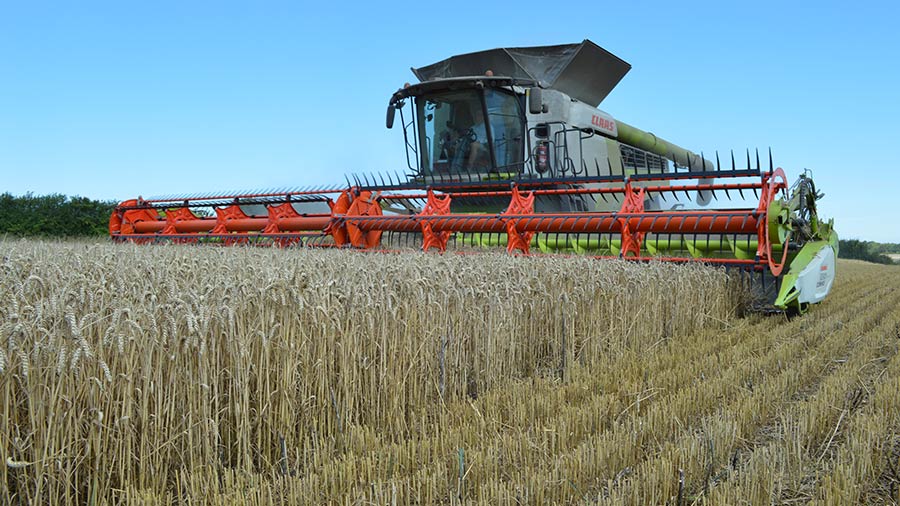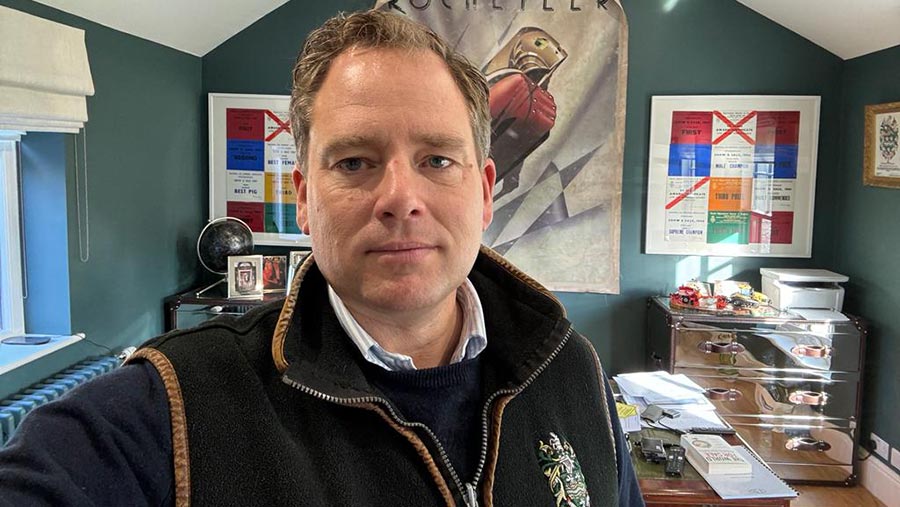Food security put in peril by Defra’s SFI policy, warns farmer
 Harvesting winter wheat variety Dawsum on Driver Farms © MAG/David Jones
Harvesting winter wheat variety Dawsum on Driver Farms © MAG/David Jones Cambridge arable farmer and Nuffield scholar James Peck has written to Defra to demand an urgent review of its agricultural transition, warning it incentivises farmers to take land out of production and puts food security at risk to British people.
Mr Peck is managing director of PX Farms Limited, a family agribusiness that he has built from scratch since 2003, which farms 5,000ha across Cambridgeshire, Bedfordshire, Hertfordshire and Lincolnshire.
In his letter sent to Defra farming minister Mark Spencer, Mr Peck says the menu of actions available under the 2023 Sustainable Farming Incentive (SFI) offer is “woeful”.
See also: Hill farmers unimpressed with Defra’s new ELM offer for uplands

James Peck © PX Farms
Out of the 23 SFI actions on offer, 12 are already available under Countryside Stewardship (CS) and therefore “do not represent a new offer at all”.
Over the past two years, Mr Peck has lost £600,000 a year due to reductions in Basic Payment Scheme (BPS) payments, and he has been unable to fill the void through Defra’s SFI.
He fears the situation will only get worse as, like so many farmers, Mr Peck will lose at least 50% of his BPS money this December, compared to historic levels.
PX Farms has a team of 28 employees, with casual and self-employed staff taking that number up to 49 in peak periods. In total, it looks after the interests of more than 300 people, including 27 landowners and their families, as well as providing support for subsidiary businesses all operating in local communities.
Finances ‘don’t add up’
In his letter, he says the economic prospects of his business are being “severely impacted” by the steep decline in BPS payments. He asks: “If we cannot make the finances add up, then who can?”
Mr Peck, a former Farmers Weekly Young Farmer of the Year, writes that BPS payments play an important role in maintaining food production and help farmers to negotiate unique challenges, most notably the weather.
The payments also enable him to support local jobs and invest in his business through upgrades to machinery and technology, which also supports machinery manufacturers and dealerships who employ staff and support the local economy.
Mr Peck ends his letter by urging Mr Spencer to extend the agricultural transition, halt BPS reductions and return them to historic rates “until it can offer a proper alternative funding stream to BPS”.
He sent the letter to Defra on 22 December last year, but has not received a reply.
Mr Peck told Farmers Weekly he believes the SFI is encouraging farmers and landowners to take land out of production – and Defra has not produced any analysis of the knock-on effect on self-sufficiency and food security.
“The SFI is the opportunity to get rid of machinery and staff and is the beginning of the end for farming in this country,” said Mr Peck.
“The Defra policy is encouraging people basically not to farm. If you take the legume fallow as an example, you get £593/ha, and if you are a farmer with machinery, staff, you might have hit retirement age and be tempted to take it.
“Landowners will be encouraged to surrender agreements in favour of their own SFI as opposed to employing other farmers. This will limit opportunities for new entrants and stifle the industry further.”
Farmer exodus
Mr Peck says an exodus of farmers will also cause damage to the local rural economy and subsidiary industries, including tyre companies, blacksmiths, engineers, and machinery manufacturers.
John Collen, a farmer and contractor based in Lowestoft, Suffolk, said it is “absolutely necessary” to support the environment, but not at the expense of productive agriculture, which would result in a “very high cost to the rural economy”.
“The loss of productive agriculture will have far reaching consequences for many years to come. Does Defra really want to see an end to farming?” he asked.
The NFU has urged Defra to halt any further reductions in BPS payments and carry out a mid-term review of its Agricultural Transition Plan, but Defra has rejected the call.
The union is also concerned that the retention of an element of direct support in other home nation countries, such as Scotland, will create an unlevel playing field for farmers in England.
Defra response
A Defra spokesperson said: “Every penny of reductions in direct payments is being made available to farmers through our schemes and grants.
“Our Environmental Land Management schemes are proving popular with farmers, with more than 32,000 Countryside Stewardship agreements in place – a 94% increase since 2020 – and more than 8,500 applications for the Sustainable Farming Incentive.
“We will continue to do all we can to support British farmers, and will work with them to take on board feedback so that our schemes work in the best possible way, and they can run profitable, sustainable businesses.”
